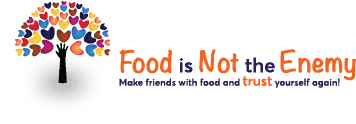Transactional Analysis (TA) is a social psychology theory developed by Eric Berne, MD. I was taught this theory when I attended a counseling skills class before beginning graduate school.
I found TA to be a very helpful tool in understanding myself, others and underlying emotions. When I teach it to clients, they also share a similar understanding and increased self awareness. It just seems to make sense.
In working with those with eating disorders, I have found that it can help one to understand behaviors as well as underlying emotions and needs… in other words, why your eating disorder is present and how to change.
Transactional Analysis says that we are all made up of parts and some of these parts are broken up into smaller parts. All the parts make a whole person. The main sections are the “Parent”, (voice of values) the “Adult” and the “Child.” The Parent part is further broken up into the “Critical Parent” and the “Nurturing Parent”. The Child part is broken up into the “Natural Child” and the “Adaptive Child.”
The theory states that we all have these parts and our parts interact with other’s parts. This can explain why some interactions do not go well. For example, if my child part is communicating with another’s child part (“let’s go on a hike”) but receives a response from the Critical Parent part (“You always decide what we do”) I may feel bad and may not ask for a hike again.
Let’s look closer at how this might occur within you.
Imagine the “Critical Parent” part. What are some things the Critical Parent part might say? “You’re fat”, “You’re Stupid”, “Why don’t you exercise”, “Stop being so lazy”. And on and on.
Imagine someone with a very large Critical Parent part. This person would be overly critical, negative, even abusive. Too much Critical Parent leads to lower self esteem and a tendency to be self destructive. The larger the Critical Parent, the larger the Adaptive Child part becomes in order to provide protection.
Now imagine the “Nurturing Parent” part. What are some things the Nurturing Parent part might say? Someone with a large Nurturing Parent part might be too forgiving, everything is okay. In other words, someone with very few boundaries. “It is okay to eat everything, no matter how it feels to your body or how it affects others” could be an example of this.
The Adult part is neutral. It speaks the facts and only the facts. There is no judgment on things, just neutral observations. For example “The movie starts at 7:00pm” is something the Adult part would say. It can draw on the resources of both parent and child.
The Child parts are key but often go completely unrecognized and even made to be wrong. The “Natural Child” part is in the moment, emotions, and spontaneity. Think of a newborn. She is a bundle of emotions and communicates only from this place. This part stays with us. We all have emotions, all the time.
The “Adaptive Child” part develops as a way to help the Natural Child get what she wants or needs. For example, a child learns that when she cries, she gets fed. As adults we learn that we have a much better chance of getting a job if we dress well and the chances decrease significantly if we show up in a bikini; unless, of course, it is a bikini modeling job. Too much Adaptive Child leads to being manipulative and overly self protected, preventing growth and getting needs met.
I think binging is the Adaptive Child trying to get all the yummy food that the Critical Parent part has denied her. After the binge, the purge is a way for the Critical Parent part to take back control and to shame the child part.
As my above example suggests, in a person with an eating disorder, often the Critical Parent and the Adaptive Child are the largest. In turn, the Nurturing Parent is small and so is the Natural Child (we use food to push down emotions). There is very little emotion allowed and very little sense of being gentle and loving toward self. The Adult part, well, it seems to me that most people have a very small Adult part, including those with eating disorders.
Let’s take a look at how this might look live.
You are hungry, or at least thinking about food. You really want a piece of chocolate cake. The Critical Parent shouts out “Don’t eat that! You will get fat.” It keeps shouting mean things like this, loudly and obnoxiously. The Natural Child hears this first and feels bad. She might sigh and say “I know, I am fat. I am gross and disgusting.” But after some time, the Adaptive Child starts to resent this and gets tired of hearing it. She doesn’t want the Natural Child to suffer, so she rebels.
She folds her arms across her chest and puts on a pouty face and says “I don’t care what you say. I am going to eat it all, the whole cake. Try to stop me. I don’t care. I can do what I want!” And, off to eating the cake she goes.
At this point, the Nurturing Parent might be encouraging her, but this part is small and is actually stuck in rebellion too, so it doesn’t really feel that great. The Adaptive Child is protecting the emotions of the Natural Child. Eating cake is a great way to do this.
After the binge is over, the cake is extinct and the Child part is full, stuffed. The Critical Parent part comes back, with a vengeance. “You are fat and gross and disgusting. You are such a pig. No one will like you like that. You are just like your mother and look how she turned out. You are going to ruin your kids and your partner won’t be attracted to you. You are sick!” The Critical Parent takes back control.
You now have proof that without criticism, you do really bad things. Throughout this whole process, the Adult part is too small to be found. The Nurturing Parent part is too small to be much use. There is no balance.
An Exercise to Create Balance
Next time you are eating, or thinking about eating, see if you can be aware of which part is doing the talking. Try acknowledging that part and the emotion it is having. See if you can go a little deeper and notice the emotion in terms of your life, rather than your food. For example, being afraid to get fat might really be a fear of not being loved. Now, see if you can give that part what it wants. It might be a cookie or it might be a hug from someone who cares about you.
This will help build the Nurturing Parent part of you by being kind about your feelings and listening to what you really want. It also helps you to acknowledge emotions, which will increase the Natural Child. The Adult part increases as judgment of yourself decreases. Making these smaller parts larger will naturally decrease the Criticism and the Adaptations.
If you found this newsletter article helpful, please feel free to pass it on.
This newsletter is an excerpt from my forthcoming book “If Your Hunger Could Talk: Listen to Your Body to Transform Your Relationship with Food and Live a More Authentic Life”

